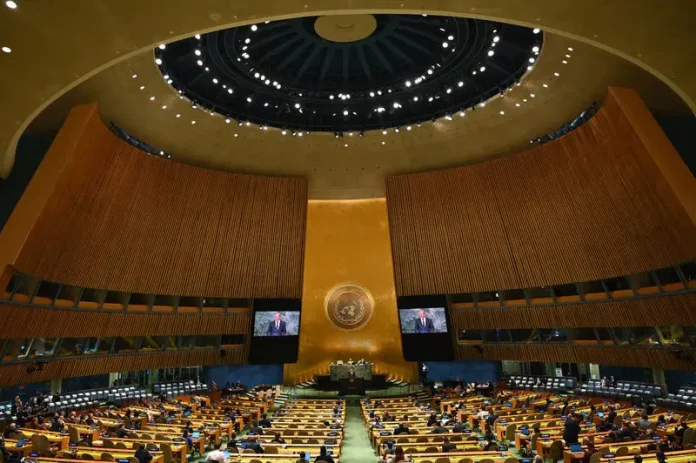The United Nations General Assembly is set to vote on Wednesday on a crucial draft resolution calling for an immediate, unconditional, and permanent ceasefire in Gaza. The resolution, while non-binding, carries significant symbolic weight as the international community seeks to address the ongoing humanitarian crisis in the region. This vote follows the United States’ veto of a similar measure in the UN Security Council.
The draft resolution also demands the immediate and unconditional release of all hostages, a key concession aimed at accommodating concerns from the United States and other staunch allies of Israel. Furthermore, it emphasizes the need for unrestricted humanitarian aid to reach Gaza’s civilian population, which has endured relentless suffering due to the prolonged conflict, particularly in the besieged northern areas.
Context of the Conflict
The current escalation in Gaza traces back to Hamas’s attack on Israel on October 7, 2023, which claimed 1,208 lives, primarily civilians. According to official data compiled by AFP, this figure includes hostages who were killed or died while being held in Gaza. Hamas militants also kidnapped 251 individuals during the attack, of whom 96 remain in Gaza, including 34 confirmed dead, according to Israeli military reports.
In response, Israel launched a large-scale military offensive in Gaza. The retaliatory strikes have resulted in over 44,786 deaths, mostly civilians, according to data provided by the Hamas-run health ministry. The figures, though contested by some, are considered credible by the United Nations. The death toll has drawn sharp criticism from human rights organizations and governments worldwide, underscoring the urgency of international intervention.
The Push for a Ceasefire
The resolution up for vote reflects growing calls for a de-escalation of violence and increased accountability. “Gaza today is the bleeding heart of Palestine,” said Palestinian UN ambassador Riyad Mansour during the General Assembly’s initial debate on the resolution. Mansour delivered an impassioned plea, urging global leaders to act decisively to end what he described as a nightmare for Gaza’s population.
“The images of our children burning in tents, with no food in their bellies, no hope, and no horizon for the future, should haunt the conscience of the world,” Mansour declared. He emphasized the need to address the longstanding “impunity” that has allowed such crises to persist.
Israel has rejected the resolution, with its UN ambassador Danny Danon arguing that true peace requires dismantling what he referred to as “the infrastructure of hate” in Gaza. Danon specifically called out the United Nations Relief and Works Agency (UNRWA), accusing its employees of facilitating Hamas’s October 7 attack.
Addressing Accountability
The draft resolution calls on UN Secretary-General Antonio Guterres to present proposals for advancing accountability in Gaza. While an earlier version of the resolution included language to establish an international mechanism to investigate and prosecute violations of international law against Palestinians, that provision was omitted from the current draft.
However, the resolution still emphasizes the importance of addressing human rights violations and ensuring justice. It seeks to balance the demands for accountability with immediate humanitarian priorities, a move aimed at garnering broader international support.
UNRWA Operations Under Threat
A second draft resolution to be voted on Wednesday will focus on ensuring Israel respects UNRWA’s mandate and allows the agency to continue its “safe and unhindered humanitarian assistance” operations. This comes after Israel announced a ban on UNRWA’s activities, set to take effect on January 28, 2025.
The decision has sparked widespread condemnation, including from Israel’s close ally, the United States. Critics argue that restricting UNRWA’s work will exacerbate the already dire humanitarian situation in Gaza, where the agency plays a critical role in providing aid and support to civilians.
Global Reactions and the Path Forward
The looming vote has drawn attention from global leaders, humanitarian organizations, and activists who are urging the UN General Assembly to take decisive action. The resolution represents a critical test of the international community’s commitment to peace, accountability, and the protection of civilians caught in conflict.
Commissioning a ceasefire and ensuring the flow of humanitarian aid are seen as essential first steps in addressing the crisis. Yet, the broader challenges of securing lasting peace and justice remain daunting.
As the vote approaches, the international community is watching closely, with hopes that the General Assembly’s actions will pave the way for meaningful dialogue and a resolution to one of the most devastating conflicts in recent history.
“This is not just about Gaza or Israel; it is about our collective humanity,” said a diplomat involved in the discussions. “The choices we make today will shape the future of peace and security in the region and beyond.”

